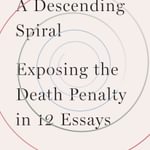
In the July 2021 episode of Discussions with DPIC, DPIC Executive Director Robert Dunham talks with Marc Bookman, the co-founder and Executive Director of the Atlantic Center for Capital Representation (ACCR), about his critically acclaimed new book, A Descending Spiral: Exposing the Death Penalty in 12 Essays.
In their discussion, Bookman and Dunham explore a wide range of systemic death-penalty problems addressed in the book, which was released by The New Press in May 2021. The topics include mental illness, racial injustice, judicial and juror bias, ineffective representation, and prosecutorial misconduct.
Bookman, whose essays have appeared in national publications such as the Atlantic, Mother Jones, Vice, and Slate, decided to write about the death penalty through individual stories that illustrate the depth of the problems endemic to capital punishment. “The media has so misinformed the public,” Bookman says. “My thinking about this was that if the average person … just knew the honest facts about the death penalty, they would be disinclined to favor it, they would see it as the failed public policy that it really is. So, I decided to write essays that … were not dense …. I tried to write it in a way that is accessible to the public.”
Andre Thomas and the problem of mental illness: he gouged out his remaining eye and ate it.
Bookman illustrates the failure of the death penalty to come to grips with the issue of mental illness by telling the story of Texas death-row prisoner Andre Thomas. Thomas, who is profoundly mentally ill, had unsuccessfully sought treatment for psychotic symptoms, including auditory hallucinations and religious delusions, in the days before committing a horrific triple murder. Believing his estranged wife was Jezebel, their son was the Antichrist, and her daughter was an evil spirit, he stabbed the three of them to death. Using separate knives so as not to spread evil from one to the other, “he removed their hearts and put them in his pocket and went home,” Bookman said, leaving a folded dollar bill back-side up at the scene. In prison awaiting trial, he gouged out his right eye to prevent the government from spying on him through it. After he was convicted and sentenced to death, he gouged out his remaining eye and ate it.
“His profound mental illness couldn’t be much more obvious,” Bookman says. “And yet, the state of Texas sought [and] achieved [a death sentence] and continues to seek his execution.” And as for the dollar bill: on the back, in the left-hand circle, there is a pyramid with 13 tiers and an eye looking out at the top of the pyramid. Thomas referred to himself as the 13th warrior, one for each tier. Given his religious delusions, the New Testament passage in Matthew 5:29, “If your right eye causes you to sin, gouge it out and throw it away,” was particularly significant. “When someone commits a crime like this, given his motivations, his hallucinations and delusions, and religious motivations, he obviously is less culpable than most other people who commit a crime of murder.”
“We’re talking about a man who is about as mentally ill as you can get, and he’s leaving breadcrumbs along the way to see it. It’s hard to miss it,” Bookman said. Yet the prosecution found a mental health expert who testified that Thomas was “malingering” — “[t]hat’s the old ‘follow the money story,’ in my opinion,” Bookman says — and Thomas’s “profoundly ineffective” court-appointed lawyers “miss[ed] those breadcrumbs.”

How to tell the stories
Bookman’s account of the Andre Thomas case also informed the way he crafted the individual essays and chose the order in which they appeared in the book. “When I would write an essay, I would always try to find a new issue” to emphasize, he says. “In other words, if I wrote an essay about prosecutorial misconduct, I would try to write the next essay about ineffective assistance of counsel or a racist juror. Whatever the topic was, I would try to change my topic. But as I delved into the case, I would always find overlapping issues. …. So, you know, while I would start out trying to write on one topic, it never worked out that way, because a bad defense bar leads to prosecutorial misconduct, a bad defense bar leads to racism in the system, … mistakes by witnesses.”
That is one of the key points of the book and key problems of capital punishment, Bookman says. The issues are “all interwoven. So, while I would try to pick a topic that I hadn’t written about before, there was always an overlap. … There’s never just one isolated problem.”
Race is an issue ‘in virtually all’ death penalty cases
It is hard to talk about the death penalty without talking about race, Bookman told Dunham. “A lot of people think racism is at the heart of capital punishment, that it was a legal replacement for lynching,” he says. “You see race discrimination in so many of these cases, virtually all of them, in my opinion.”
“In Andre Thomas’s case,” Bookman says, “the racial issue is about as obvious as it gets. He’s a Black man who kills his white wife, her mixed-race children, one of whom was his.” Three of the empaneled jurors and one alternate said in their juror questionnaires that they opposed interracial marriage. Yet, the defense lawyers perfunctorily question one of the jurors “and then they don’t question the others at all,” Bookman said. “So, these three people opposed to interracial marriage sit in judgment.” Worse yet, he explains, “Andre Thomas had some white friends and those friends testify at his trial as character witnesses. … And the prosecutor at the end of the case stood up and said, how would you like your daughter or granddaughter to come and date Andre Thomas? —a very, very overt attempt to arouse racial prejudice amongst this jury.”
While the issue of race “is all over this case, … it is very, very hard not to recognize racism in many of these capital cases,” Bookman said. A Descending Spiral also contains an essay about an overtly racist judge and another about a juror who used the N word in explaining why he returned a death sentence against a Black defendant. “These cases are not isolated incidents,” Bookman stresses, pointing to a scandal in Pennsylvania “about racist, pornographic, misogynistic emails that circulated throughout the justice system that ultimately required two justices from the Pennsylvania Supreme Court to resign.”
Defense counsel: ‘the central question’ and ‘a mystery of the ages’
Bookman calls the problem of inadequate defense representation “the central question” in the administration of the death penalty in the U.S. A trial lawyer for 17 years in the Defender Association of Philadelphia’s renowned homicide unit, he points to the city’s experience as a “petri dish” in which to examine the impact of counsel. The Defenders were permitted to begin handling Philadelphia capital cases only after more than 100 defendants already had been sentenced to death under the city’s court-appointment system. Still, Defender representation was capped at 20% of the city’s homicide cases. During Bookman’s time in the unit, another 90 men and women were sent to death row from Philadelphia, but not a single client of the Defender Association was sentenced to death.
Bookman discussed a RAND Corporation study of Philadelphia homicide cases published in the Yale Law Journal that compared the outcomes of cases handled by the Defender Association, who, he says, “applied the ABA guidelines [on death penalty representation] and took the cases very, very seriously” with the outcomes in cases handled by court-appointed lawyers who “were not resourced, they were not trained, they were not consulted with, and they were consequently horribly ineffective.” Defender Association clients, the study found, were “61% less likely to be convicted of first-degree murder, 19% more likely to be acquitted entirely, and your overall sentence was 24% less,” Bookman explained. “The kicker to this study,” he said, was that over the course of the 11 years of cases RAND reviewed, “the taxpayers saved over $200 million in incarceration costs.”
Bookman notes that he’s “not talking about Dream Team defense counsel.” What’s necessary, he says is “qualified and effective defense counsel.” In Virginia, which in its history from colonial days to the present executed more people than any other U.S. jurisdiction, “they brought in regional counsel offices … that basically ended the death penalty there. For years and years and years, 10 years, no death sentences in Virginia, all because of competent and effective defense attorneys. And Virginia then ended the death penalty because there was no point in having it anymore. Spending money for a punishment that was never returned was foolish for the Virginia legislature, and they ended the death penalty entirely.”
To Bookman, “the lesson learned seems clear: not only are you going to avoid a death sentence with competent lawyers, but you’re going to save taxpayer money if we just properly fund competent, effective lawyers. And why we don’t do that is a mystery of the ages.”
‘We need to prosecute’ prosecutors who hide evidence
About a third of the essays in A Descending Spiral involve overt prosecutorial misconduct. Bookman criticizes the Brady rule — the constitutional test for disclosing exculpatory evidence that leaves it to prosecutors to determine what impact the evidence would likely have on a case — as having “very much of a fox-guarding-the-henhouse kind of feel.” It is an inadequate remedy in a system in which, Bookman says, “[p]rosecutors consistently are hiding evidence that we discover sometimes decades later.”
“There is a cure for this problem,” he says, “and it’s a cure that we never take or almost never take. When we catch a prosecutor hiding evidence that puts somebody in prison for decades, we need to prosecute that prosecutor. … [W]hen you’re obstructing justice in such an overt way, you really have to be prosecuted for it.”
Bookman says “I’ve been in courtrooms where judges have said, thankfully, we’ve avoided an injustice here when someone gets out of prison 20 years later, who might have been executed. … I hardly call that avoiding an injustice.”
A lesson from the Titanic
Bookman ends his book — and he and Dunham end their discussion — with an allegory based upon a statement by the second mate on the Titanic. “What I was most concerned about when I was putting this book together was the idea that I was cherry-picking these cases,” Bookman says, “that I was finding the worst judge and the worst prosecutorial misconduct, and the worst racist lawyers and jurors, and putting it together and kind of trying to paint a picture of just how awful things were, when really I was just picking 11 or 12 isolated situations.”
The message of the book, he says, “is that these are not isolated instances. … I am not cherry picking the disasters that these essays represent.” Bookman did not select any high-profile cases for his essays; the cases, he says “are relatively unknown” to the general public. “And that was the point,” he says, “that if you look at the average case, these cases are literally, to steal the allegory, they are the tip of the iceberg. … [T]he problem is much broader and greater than we might realize. And once we realize that, then ending the death penalty seems like the logical conclusion to draw.”
Discussions with DPIC Podcast, Capital Defense Lawyer Marc Bookman Discusses His New Book and the Systemic Defects that Have Sent the Death Penalty into‘A Descending Spiral’, published July 27, 2021.
Representation
Oct 30, 2024


